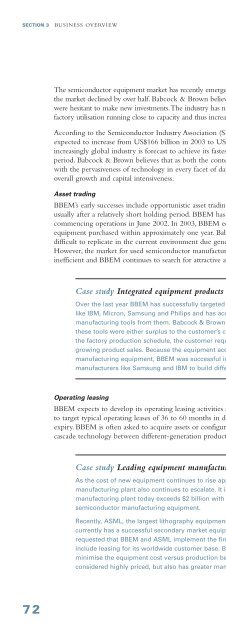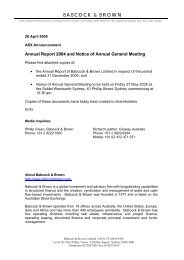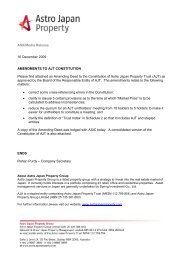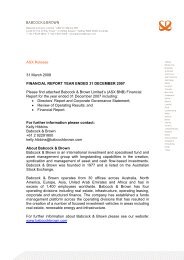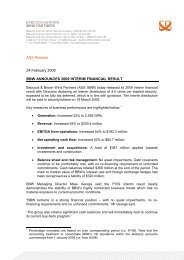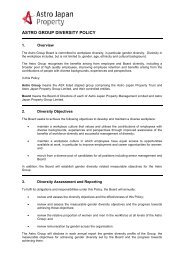Lead Manager
babcock & brown limited prospectus.pdf - Astrojapanproperty.com
babcock & brown limited prospectus.pdf - Astrojapanproperty.com
- No tags were found...
You also want an ePaper? Increase the reach of your titles
YUMPU automatically turns print PDFs into web optimized ePapers that Google loves.
SECTION 7<br />
RISK FACTORS<br />
7.1.18 Interest rates<br />
Babcock & Brown, as a borrower of money, is potentially exposed to adverse interest rate movements that may<br />
increase the financial risk inherent in its business.While this risk may be reduced through interest rate hedging,<br />
such as interest rate swaps or other mechanisms, there is sometimes residual risk.<br />
Low interest rates may also have an adverse impact on the revenues of the Group’s leasing activities since lower<br />
interest rates may encourage debt funded acquisition of assets over finance leasing.The related tax deductions<br />
generated by some of the Group’s investment products also become less valuable in a low interest rate<br />
environment which may adversely impact the Group’s earnings.<br />
7.1.19 Inflation risk<br />
Depending on the anticipated cash flows from an investment, investment returns can be affected by changes in<br />
the rate of inflation in a particular jurisdiction or geographic region.<br />
7.1.20 Foreign exchange<br />
More than 50% of Babcock & Brown’s earnings are generated in currencies other than the Australian dollar,<br />
exposing the Group to adverse foreign exchange movements. As discussed in Section 4.9.5, Babcock & Brown<br />
has a policy of hedging the value of investments made in non-Australian markets. Since the majority of the<br />
Group’s expenses are denominated in the same currencies as the associated revenues, only the net income after<br />
total compensation is generally exposed to currency fluctuations.<br />
7.1.21 Tax<br />
The income tax expense included in the forecast statement of financial performance for the year ending<br />
31 December 2005 is predicated on the reorganisation of the Group and future operations of the Group being<br />
subject to the tax laws in the countries in which the Group operates on a basis that is consistent with current law<br />
and interpretation of the law. Any change to the current rate of company income tax in any of the jurisdictions<br />
where Babcock & Brown operates may impact on financial performance and cash flows, ability to pay dividends<br />
and Share price, which could impact Shareholder returns. Any changes to the current rates of income tax<br />
applying to individuals and trusts will similarly impact on Shareholder returns. In addition, any change in tax<br />
arrangements between Australia and other jurisdictions could affect the ability of the Group to restructure its tax<br />
affairs from a US domicile to an Australian domicile and thereby have an adverse impact on future net operating<br />
profit after tax, net operating cash flows and the level of dividend franking.<br />
7.1.22 Insurance<br />
Babcock & Brown has insurance, including Errors and Omissions (Professional Indemnity) and Directors and<br />
Officers insurance, which it believes to be commensurate with industry standards, and adequate having regard to the<br />
business activities of Babcock & Brown. However, there are risks that this will be insufficient to meet a very large<br />
claim or a number of large claims, that either Babcock & Brown or one of its investments is unable to secure<br />
insurance to satisfactorily cover all anticipated risks or that the cost of insurance will increase beyond anticipated<br />
levels.<br />
7.1.23 Information technology<br />
Babcock & Brown relies on various information systems, technology and software products to efficiently carry<br />
out its business.While Babcock & Brown has put in place procedures and plans to ensure that data is retained and<br />
that these systems are maintained to meet the demands of the business, widespread system failures may negatively<br />
impact on the Group’s performance.<br />
7.1.24 Change in accounting, legal and tax regimes<br />
Babcock & Brown operates in and across a variety of accounting, legal and tax regimes. Change in these regimes,<br />
whilst providing opportunities, could also limit the functionality of the financial structures that Babcock & Brown<br />
has developed for clients, which could impact on business performance, particularly of the Structured Finance<br />
Group. Further, any structured financial products utilised when principal investing may also be adversely impacted<br />
by changes in accounting, legal or tax regimes.<br />
144


